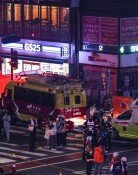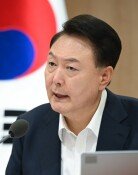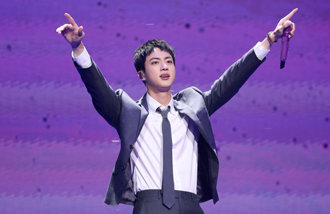[Editorial] South Korean Presidential Hopefuls with Kim Yong Nam
[Editorial] South Korean Presidential Hopefuls with Kim Yong Nam
Posted May. 12, 2007 08:26,
Former governor of Gyeonggi Province Sohn Hak-gyu, who is visiting Pyongyang, met with Kim Yong Nam, president of the Presidium of the Supreme People`s Assembly of North Korea on May 10. They shook hands with each other with broad smiles and had a 40-minute conversation. North Koreas nominal head of state Kim Yong Nam is a frequent newsmaker for South Koreas media. Around a week ago, he met with Uri Party lawmaker Kim Hyeok-gyu and his delegation, producing the same scene with former prime minister Lee Hae-chan on March 8.
Although the three visitors are all considered potential presidential candidates, former Gyeonggi governor Sohn currently belongs to no party, since he already defected from the Grand National Party. However, although Sohn is representing no party, North Korea did allow Sohns meeting with Kim Yong Nam to be broadcast in South Korea. It seems that North Korea wants to display its influence on another countrys presidential election by showing that South Koreas presidential candidates are more than willing to visit and take pictures at the North Korean Supreme People`s Assembly in Mansudae Hall.
What is also troubling is that confusion can be created in South Koreas policy toward North Korea. If some politicians, who may not be in a position to hold negotiation with North Korea, visit the North without any principles and present their own version of negotiation packages, confusion will arise. It is also doubtful whether they can get effective promises from Kim Yong Nam. No grand explanation is needed that Kim Yong Nam is externally known as the second in North Koreas power structure, but his power is only nominal. He is not even a member of the National Defense Commission where Kim Jong Il is the chairman. If South Korean politicians continue to visit Mansudae Assembly Hall one after another while fully aware of such a power structure, their actions can only be interpreted as opportunistic ones to raise their political status and value by taking advantage of North Koreas strategy toward the South Korean presidential election.
Chinese Professor Zhang Liangui, an expert on North Korea at the Central Party School, talked about the strategy a few days ago in his remark at the 8th World Korean Forum. He said, North Korea will completely dominate control in inter-Korean relations with its nuclear program and by using tactics of forming the atmosphere as if a war is around the corner, it will intervene in South Koreas domestic politics. He said that North Korea will make the South Korean people feel like they are being held hostage to the North by conducting nuclear tests, and then leverage this psychology to interfere with South Koreas presidential election.
Earlier this year, North Korea put its interference with the Souths presidential election in public by urging pro-North Korean, leftist groups in South Korea to form anti-Grand National Party coalitions. In this situation, potential presidential candidates are almost vying with each other to meet the North halfway. It remains to be seen how effective their meetings with the North Korean official will turn out in rallying support among the Korean public for the presidential election.
Headline News
- S. Korea faces shortage of science and engineering talent
- S. Korean military resumes artillery drills near N. Korean border
- Seoul breaks ground on city's first K-Pop concert hall 'Seoul Arena'
- Trump gains momentum in election bid after partial immunity ruling
- Judoka Huh Mi-mi: ‘We must sing National Anthem at Paris Olympics’







